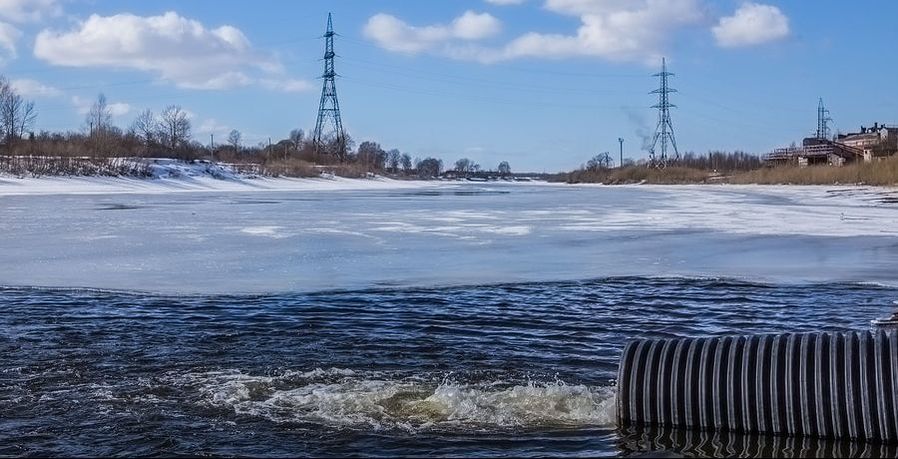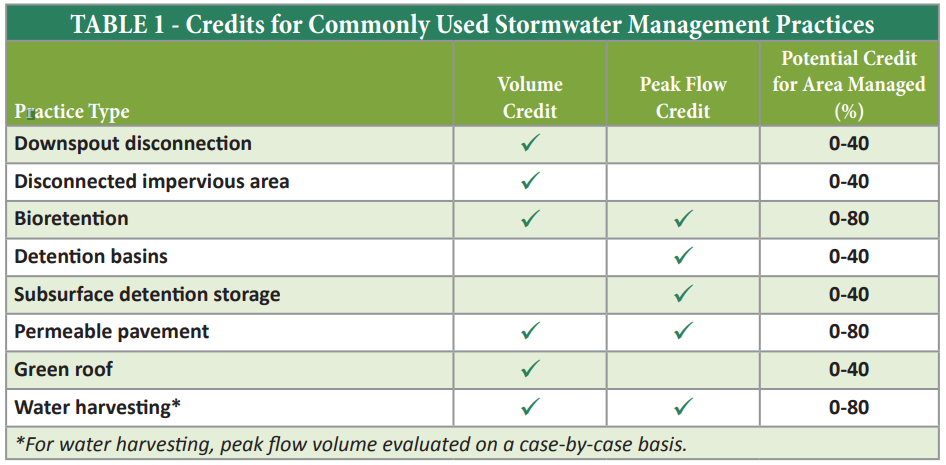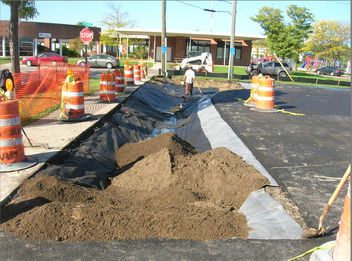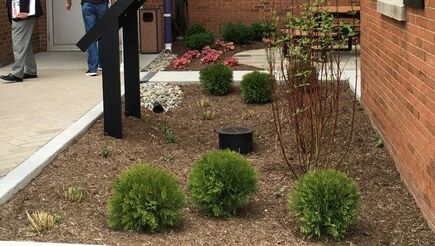In October 2016, the Detroit Water and Sewerage Department (DWSD) started charging property owners a fee to discharge stormwater generated from each parcel within city limits to sewers. Like many older communities, Detroit has a combined sewer system, meaning the sanitary sewer and stormwater flow to the same piping system and end up at the wastewater treatment plant (WWTP) or combined sewer overflow (CSO) control facilities. To offset the fee, DWSD also rolled out a stormwater credit program, encouraging their customers to reduce their monthly stormwater charges by earning volume credits (lowering the volume of stormwater leaving their site), or peak flow credits (retaining their stormwater temporarily after a rain event before releasing it to the sewer). Volume credits are available because DWSD’s portion of the costs associated with running the WWTP are determined based on the amount of wastewater volume generated by parcels in the City of Detroit. Peak flow credits are available because Detroit has to build CSO control facilities to detain and treat the water during large storm events. Reducing the amount of stormwater entering the system would reduce the need to build and maintain more of these facilities.
How to Lower the Cost of a Stormwater Bill
DWSD determines the stormwater bill for each customer by calculating the amount of impervious area (parking areas and roofs) on the site and multiplying it by a drainage charge rate. Therefore, the best way to achieve savings is by removing impervious surfaces (unnecessary parking/pavement areas, unused buildings) from the property and replacing them with pervious surfaces (grass, landscaping, gravel), if plausible. Customers can reduce their stormwater fees because they are not billed for pervious areas on their property, only the impervious areas.
Of course, customers cannot remove all impervious areas on their site, and that’s where the stormwater credits and green stormwater infrastructure (GSI) practices provide financial relief. Credits can be achieved through a number of common GSI practices, including bioretention (rain gardens, bioswales, planter boxes), roof drain disconnection (sending gutters to lawn areas or GSI practices instead of the sewer), detention basins, green roofs, rainwater harvesting/ reuse, and permeable pavement. Customers can achieve volume credits with retention, by allowing their stormwater to infiltrate into the ground on their site rather than entering the sewer. They can earn peak flow credits with detention by releasing their stormwater slowly over a period of time. Customers can receive up to an 80 percent reduction of their stormwater charge by implementing practices that achieve both volume and peak flow reduction, or 40 percent for implementing one type of practice (volume or peak reduction).
To begin the process, customers first contact DWSD and set up a free site assessment. DWSD representatives will come out to the property, perform a site assessment, and develop a conceptual report and plan, including projected costs, savings, and payback period associated with the installation of GSI practices. During this process, the customer can hire a consulting engineer to move forward with the conceptual plan and perform a full design for the site; a licensed professional engineer (PE) is required to seal the construction drawings. The consulting engineer can complete design and construction plans, finalize the cost estimate, complete the appropriate credit applications and supporting documentation, and help the customer receive approval from DWSD through negotiations. The property owner will need to hire a contractor to install the GSI practices, and after it is built, a PE certifies constructed conditions to receive credits. The credits remain valid for 3 years; afterwards, if a PE or certified stormwater operator confirm acceptable operation and performance, the owner will continue receiving stormwater credits for another 3 years.
DWSD set up the Capital Partnership Program (CPP), in which non-residential customers can receive a grant that covers up to 50 percent of a GSI practice installation project with a maximum grant of $50,000. To receive a grant, the applicant must meet the requirements outlined in the application and sign an agreement with DWSD for ongoing maintenance. Non-profit organizations can earn credits through community outreach by educating residents about the stormwater credit program. Non-profits can receive credits by sharing information with residents, collecting awareness surveys, providing testimonials, and hosting events for DWSD. To be considered for this program, non-profits must submit an application, enter into an Outreach Credit Agreement, and, once approved, submit validation of successful outreach activity. There are other sources of funding available in the area, such as from the Southeast Michigan Resilience Fund, a public-private partnership to improve natural resources in Southeast Michigan.
Summary
GSI practices offer benefits to DWSD due to lower volumes, which help Detroit comply with federal environmental mandates, but also offer benefits to a property owner, as the upfront cost will eventually pay off through savings on the stormwater charge in the future. GSI practices also improve water quality, restore natural features, and reduce flooding concerns and combined sewer overflows attributed with large storms.
NTH can help clients with similar challenges through creative GSI design. If you are interested in a consultation with your stormwater project, please contact me at sgrant@nthconsultants.com.
Links to More Information
DWSD Drainage Guide and Applications
Community Outreach Credit Information
DWSD Capital Partnership Program Application
Southeast Michigan Resilience Fund Information





 RSS Feed
RSS Feed